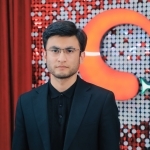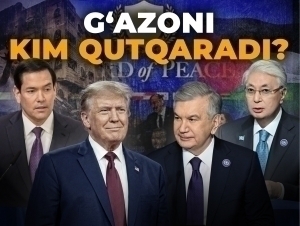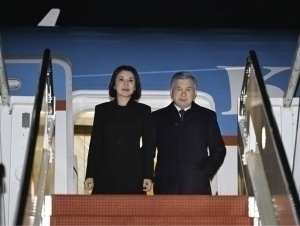Midweek: Kadyrov signals exit, trump courts Central Asia, Syria makes western inroads
Review
−
08 May 2025 8122 8 minutes
Kadyrov Signals Resignation—but Does He Mean It?
One of the most striking developments this week was the unexpected announcement from Ramzan Kadyrov, the head of the Chechen Republic within the Russian Federation, who said he intends to step down. On May 5, during an interview with journalists, Kadyrov stated that he planned to resign. While he acknowledged numerous rumors circulating about him, he insisted that the initiative to leave his post was entirely his own. He expressed hope that his resignation would be accepted.
However, shortly afterward, Kadyrov posted on his Telegram channel to clarify that many people had misunderstood his remarks. He emphasized that the only person who would ultimately decide his fate was the Supreme Commander-in-Chief, President Vladimir Putin. Referring to himself as a loyal foot soldier, he pledged to carry out any orders received.
Kremlin spokesperson Dmitry Peskov later confirmed that Putin and Kadyrov would meet on May 7. Kadyrov would also be present at some international meetings attended by Putin. On the day of the meeting, Kadyrov congratulated Putin on the 25th anniversary of his leadership and appeared alongside him at a meeting with Venezuelan President Nicolás Maduro.
Ramzan Kadyrov has led Chechnya since April 5, 2007, making him the longest-serving regional leader in Russia today. He was last re-elected in September 2021 with 99.7 percent of the vote, a margin that rivals that of North Korean leader Kim Jong-un. His current term is set to expire in 2026.
Kadyrov has been the subject of intense media scrutiny, especially regarding his health. According to the analytics firm Medialogiya, Kadyrov was the most-discussed regional leader on Russian social media in March 2025, with over 166,000 messages mentioning him. Numerous reports, particularly from Novaya Gazeta, claim his health has deteriorated severely. It is alleged that he rarely leaves Chechnya and spends most of his time at the Aymed clinic in Grozny, sometimes even sleeping there. Six years ago, Kadyrov was reportedly diagnosed with incurable pancreatic necrosis.
Recent reports suggest that Kadyrov has been seeking refuge in Middle Eastern monarchies, likely as part of an exit strategy from Russia. There has been a noticeable uptick in speculation about his possible flight abroad and concerns over his family's safety post-resignation. The media has repeatedly highlighted his serious health conditions and the increasing pressure he faces to secure a future for his extensive family. According to the investigative publication Vazhnye Istorii, Kadyrov tried to conceal these negotiations from the Kremlin, but the Federal Security Service eventually informed Putin.
These rumors are supported by Kadyrov’s recent diplomatic engagements. On March 19, he visited the United Arab Emirates and met with President Mohamed bin Zayed Al Nahyan, whom he called his “big brother.” Kadyrov later praised the UAE leader in glowing terms on Telegram, describing him as a wise and inspiring Muslim leader with whom he shares strong, trust-based relations.
“I am infinitely proud of our brotherhood, friendship, and relations based on trust and mutual understanding. We share common values and goals, which makes our partnership especially strong and effective. I always feel support and respect from the Sheikh,” Kadyrov wrote.
In October 2024, he had also shown high regard during a visit to Russia by Middle Eastern leaders. Yet, despite these signs of outreach to foreign allies, neither Kadyrov nor Putin has commented publicly on the rumors surrounding his health or possible resignation.
During their May 7 meeting in Moscow, Putin praised Kadyrov’s accomplishments, especially in reducing unemployment and boosting economic indicators in Chechnya. Kadyrov also updated Putin on Chechnya’s military contributions to the war in Ukraine, reporting that 55,500 fighters had been deployed, including 21,600 volunteers. Notably, the topic of resignation was not brought up during the meeting, according to the Kremlin’s published transcript.
Washington’s Offer to Uzbekistan: A New Strategic Transit Hub for Deportees?
On April 30, the U.S. Department of Homeland Security (DHS), in collaboration with the government of Uzbekistan, thanked the Central Asian country for deporting Uzbeks who were illegally residing in the United States. As part of a coordinated operation, over 100 illegal immigrants—from Uzbekistan, Kazakhstan, and Kyrgyzstan—were deported, with Uzbekistan covering the full cost of repatriating its citizens. This marked the first such deportation flight financed by a foreign government since Donald Trump returned to the presidency.
Uzbekistan’s proactive approach appears to have improved relations with Washington. According to The Washington Post, the Trump administration has offered Uzbekistan a package of incentives in exchange for accepting immigrants deported from the U.S., including not only Uzbeks but also Russians and Belarusians. With direct U.S. flights to Russia and Belarus suspended due to geopolitical tensions, Trump’s administration is reportedly considering Uzbekistan as a transit country.
An American official reportedly proposed benefits that could include a high-level phone call or meeting between President Trump and Uzbek President Shavkat Mirziyoyev. The Uzbek Embassy in Washington did not respond to the newspaper’s inquiries, prompting QALAMPIR.UZ to reach out to Ahror Burhonov, spokesperson for Uzbekistan’s Ministry of Foreign Affairs. Burhonov said he had no information about such an agreement and that the embassy in Washington had not received any official communication regarding the proposal.
White House Frustration Over Putin’s Stance in Ukraine Talks
White House National Security Advisor Keith Kellogg said this week that although Ukraine is not pleased with all the proposed terms of a ceasefire, the parties are close to an agreement. He revealed that Kyiv has agreed to a comprehensive 30-day ceasefire, which could extend across land, sea, and air.
Kellogg repeated a familiar line: "Only one person can achieve a clear result—President Donald Trump." However, he noted that one of the biggest obstacles to reaching a final deal is Russian President Vladimir Putin.
“I think we are close. The only person who can achieve a result is President Trump. Perhaps our obstacle is the President of Russia, who does not agree,” Kellogg said.
Vice President J.D. Vance echoed this sentiment during a speech at the Munich Security Conference forum in Washington on May 7. He said that while Russia is not entirely opposed to peace, its demands are too high.
“I wouldn’t say the Russians are not interested in a deal. I would say that the Russians are currently putting forward certain demands, a certain set of concessions to end the conflict. We think they are asking for a lot, you understand?” Vance said.
He added that Trump’s most significant contribution was pushing Moscow to reveal its real intentions in Ukraine. Until then, Russia had advanced militarily without stating its goals. Washington was surprised by Moscow’s initial demands, which implied ambitions beyond eastern Ukraine—perhaps even complete annexation.
Syria’s New President Opens Diplomatic Doors in Europe—and Seeks Trump Meeting
On May 7, Syria’s new president, Ahmed al-Sharaa, made his first visit to Europe, beginning with France. He met with President Emmanuel Macron at the Élysée Palace to discuss enhancing bilateral relations and Syria’s internal security situation.
The visit was controversial. Marine Le Pen, leader of France’s National Unity Party, called the meeting “provocative and irresponsible,” accusing Macron of legitimizing a “jihadist.” On her social media page, she described the visit as “shock and horror.”
This diplomatic overture was long in the making. Back in February, Macron and al-Sharaa had held a phone call in which Macron congratulated him and invited him to France. Following regime changes in December 2024, European nations and global institutions have warmed to al-Sharaa’s administration. German delegations have visited Damascus several times, and the United Nations is exploring ways to cooperate with Syria’s new leadership.
Despite ongoing tensions with Israel and the Druze minority, Syria’s international image is improving, in large part due to the inclusive character of its new government. The meeting with Macron was seen as a breakthrough step in reintroducing Syria to the Western diplomatic stage.
But France may not be the last stop. According to The Wall Street Journal, citing Syrian officials, al-Sharaa hopes to meet with President Donald Trump during Trump’s visit to the Middle East from May 13 to 16. Trump’s itinerary includes stops in Saudi Arabia, Qatar, and the UAE, and he is scheduled to attend a summit hosted by Saudi Crown Prince Mohammed bin Salman. Leaders from all six Gulf Cooperation Council countries are expected.
Al-Sharaa reportedly wants to discuss Western investment opportunities in Syria. Last week, Jonathan Bass, CEO of U.S.-based Argent LNG and a known Trump supporter, visited Damascus. He presented a plan for Western companies to extract Syria’s energy resources in cooperation with the newly established Syrian National Oil Company. According to Bass, al-Sharaa would support the plan if sanctions were eased.




